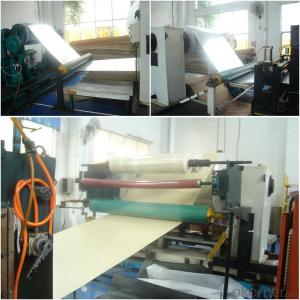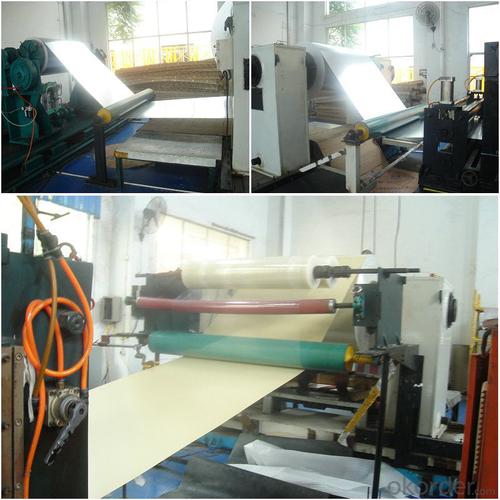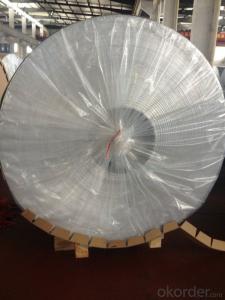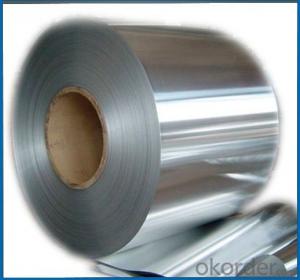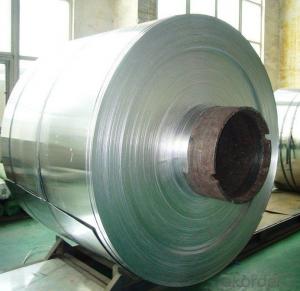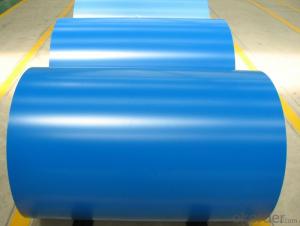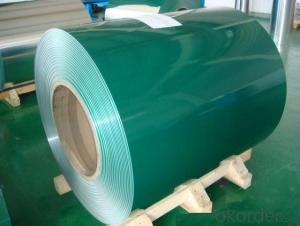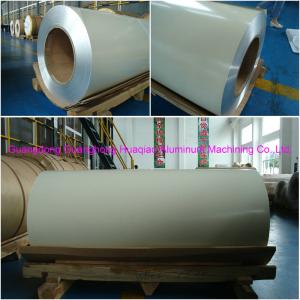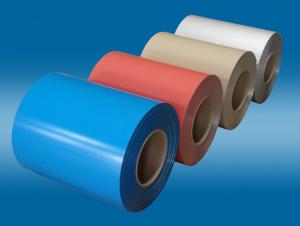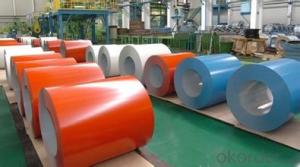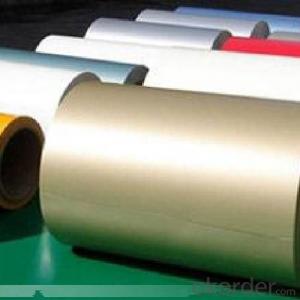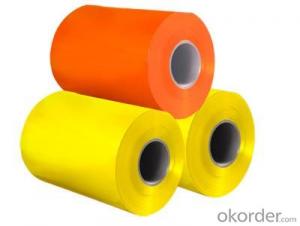48 Inch Aluminum Coil - Solid Color PE Prepainted Aluminum Metal Materials
- Loading Port:
- China Main Port
- Payment Terms:
- TT OR LC
- Min Order Qty:
- -
- Supply Capability:
- -
OKorder Service Pledge
OKorder Financial Service
You Might Also Like
Featuresof PVDF Aluminum Coil:
1. Adoptingprecision rolling coating technology, our PE coated coil can ensure excellentadhesive without coating omission.
2. For the PVDFcoated aluminum sheet we produced, there are various colors for your choice.
3. Usinginfrared heating technology to protect environment from pollution.
4. Ourcoated aluminum coil has four-roller coating line, uniform coating thicknessand good features.
Raw Materialof the PVDF Coated Aluminum Coil:
1. AluminumCoil: high strength aluminum with alloy of AA1100 (aluminum alloy is availablewith AA3003, AA3005, AA5005 according to customer)
2. SurfacePaint: PE, PVDF and special paints.
Specificationof the PVDF Coated Aluminum Coil:
Width: 20mm~1590mm
Thickness: 0.06mm~1.0mm
ExternalDiameter: ≤ 1500mm
InternalDiameter: 405mm, 505mm, 150mm, 75mm
Coil weight: ≤ 4000kg
Performance and usage
PVDF coated aluminumcoils are specially processed through the technics of roller coating and bakingwith precise paints from BECKER INDUSTRIAL COATINGS in
Performance of the coating
Aluminum Thickness | Coating Thickness | MEK | T Bend | Impact | Adhesion | Pencil Hardness | Boiling Water Proof |
0.3-1.5mm | ≥25μm | ≥100 Times | ≤2T | 50kg•cm | 0 Grade | ≥HB | no change within 2 hours |
0.15-0.28mm | ≥25μm | ≥100 Times | ≤2T | 20kg•cm | 0 Grade | ≥HB | no change within 2 hours |
Color ofCard
Our PVDF coated aluminum coil is made offluorine carbon resin, pigment, ester solvent after high temperature roastingand baking. The paint of this PVDF coated aluminum coils are solidified to dryfilm with super weather resistance. PVDF coating also can be classified astraditional PVDF and nanometer PVDF coating.
A. Traditional PVDF Coating, with KYNAR500 PVDF and two or three times forcoating and baking, has good properties of anti-acid, anti-alkali and isdurable in atrocious weather and environment, keeping 15 years no unwontedfading. In view of these facts, we recommend this PVDF coated aluminum coilsare applied for external wall cladding.
B. Nanometer PVDF Coating, which different with traditional PVDF, is the clearcoating. It contains nanometer element, which can protect panel from pollution,because nanometer has self-cleaning effect, it is easy to get rid of dust andpollution by raining or water.
Color Match
For custom' color requests, we can deal as following:
1. Supply a physical sample of custom color. A color sample on metal ispreferred. If other, it is also acceptable. But the color matching rate may benot good as color on metal.
2. New color sample is usually offered by our paint supplier in 5-7 days,special color should be in 7-10 days.
3. Upon receipt of color sample, please approve in writing as soon as possible.Once you approved, we will arrange purchasing and production.
Note: Color difference maybe occurred in different production batch, soit is suggested all panels are placed in one order for same project. And keepsame direction as arrow on protective film when installing to avoid any colordifference by vision.
- Q: What are the common applications of aluminum coils in the aerospace industry?
- Aluminum coils are commonly used in the aerospace industry for various applications such as constructing aircraft frames, manufacturing wings, building fuselages, and designing engine components. The lightweight yet strong nature of aluminum makes it an ideal choice for these purposes, as it helps reduce overall aircraft weight, enhance fuel efficiency, and improve performance. Additionally, aluminum's corrosion resistance properties play a crucial role in ensuring the longevity and durability of aerospace structures.
- Q: How do aluminum coils compare to other types of coils (e.g., copper)?
- The usage of aluminum coils and copper coils is prevalent in multiple industries. While each type has its own pros and cons, it is crucial to understand their relative comparisons. An important distinction between aluminum and copper coils is their conductivity. Copper is renowned for its exceptional electrical and thermal conductivity, making it the preferred choice for applications that necessitate efficient heat transfer. Conversely, aluminum possesses lower conductivity than copper, yet it still conducts electricity and heat effectively. Another factor to consider is cost. Copper is more expensive than aluminum due to its higher demand and limited availability. Consequently, aluminum coils are often chosen as a cost-effective alternative, particularly in applications where the high conductivity of copper is not necessary. In terms of weight, aluminum coils are significantly lighter than copper coils. This attribute facilitates easier handling and installation, leading to reduced transportation and labor costs. The lightweight nature of aluminum coils also renders them suitable for weight-sensitive applications, such as automotive and aerospace industries. In terms of corrosion resistance, copper coils outperform aluminum coils. Copper exhibits high resistance to corrosion, ensuring a longer lifespan and reduced maintenance requirements. Conversely, aluminum is more prone to corrosion, especially in environments with high humidity or exposure to specific chemicals. However, through proper coatings and treatments, aluminum coils can be effectively protected against corrosion. Durability is another crucial aspect to consider. Copper coils are known for their durability and ability to withstand extreme conditions, making them suitable for applications requiring longevity. While aluminum coils may not be as durable as copper, they can still offer satisfactory performance in many applications, particularly when designed and maintained appropriately. In conclusion, aluminum coils and copper coils possess distinct characteristics and advantages. Copper coils offer superior conductivity, corrosion resistance, and durability, albeit at a higher cost. On the other hand, aluminum coils are lighter, more cost-effective, and suitable for various applications. Ultimately, the choice between the two types of coils depends on specific requirements, budget constraints, and environmental factors of the given application.
- Q: What is the shelf life of aluminum coils?
- The shelf life of aluminum coils may differ based on a variety of factors, such as storage conditions, handling, and the specific alloy employed. Provided they are stored correctly, aluminum coils can generally remain usable for several years. To maintain their longevity, it is advisable to store them in a dry and clean environment, keeping them away from moisture, extreme temperatures, and corrosive substances. Moreover, one should handle them with caution to avoid any harm or contamination that might decrease their shelf life. It is also crucial to carry out regular inspections and maintenance to ensure the integrity and endurance of the aluminum coils. Ultimately, for more accurate information regarding the specific shelf life of aluminum coils, it is recommended to refer to the manufacturer's guidelines or consult a professional in the industry.
- Q: Can aluminum coils be used for signage and display applications?
- Yes, aluminum coils can be used for signage and display applications. Aluminum is a versatile material that is lightweight, durable, and resistant to corrosion, making it an ideal choice for various signage and display purposes. Its flexibility allows for easy shaping and customization, while its smooth surface provides a perfect canvas for printing graphics and designs. Additionally, aluminum coils can be easily mounted, making them suitable for both indoor and outdoor signage and displays.
- Q: Explain the differences between aluminum coil and aluminum sheet in a few sentences.
- <p>Aluminum coil and aluminum sheet are both flat aluminum products but differ in form and usage. Aluminum coil is a long, continuous roll of aluminum that can be easily unrolled and cut to length, making it ideal for manufacturing processes where the material needs to be fed through machines. It is commonly used in industries such as construction, packaging, and automotive for applications like roofing, siding, and food packaging. Aluminum sheet, on the other hand, comes in flat, rectangular pieces with specific dimensions and is typically thicker than coil. It is used in applications where a solid, non-continuous piece is required, such as in signage, furniture, and decorative elements. The thickness and surface finish can also vary between coils and sheets, with sheets often being available in a wider range of finishes and thicknesses.</p>
- Q: Are there any restrictions on the coil length of aluminum coils?
- Yes, there are restrictions on the coil length of aluminum coils. The maximum coil length is typically determined by the capabilities of the equipment used for coil production and handling. Factors such as the size and capacity of coil winding machines, transportation and storage limitations, and the weight and stability of the coil itself all play a role in determining the maximum coil length. Additionally, longer coils may be more prone to handling and logistical issues, such as increased risk of damage during transportation or difficulties in uncoiling and processing. Therefore, it is important to consider these restrictions and limitations when determining the appropriate coil length for aluminum coils.
- Q: Are there any limitations on the bending or forming of aluminum coils?
- Yes, there are some limitations on the bending or forming of aluminum coils. Aluminum is a relatively soft and malleable metal, making it easier to bend and form compared to other materials. However, excessive bending or forming can cause the aluminum to crack or rupture, especially if it is done at sharp angles or with insufficient lubrication. Additionally, the thickness and temper of the aluminum coil can also affect its ability to be bent or formed. Therefore, it is important to consider these factors and adhere to recommended bending and forming guidelines to avoid any limitations or damage to the aluminum coils.
- Q: Can aluminum coils be used in electrical busbars?
- Yes, aluminum coils can be used in electrical busbars. Aluminum is a commonly used material for busbars due to its high electrical conductivity, low cost, and lightweight properties. Aluminum coils can be easily formed into various shapes and sizes to fit specific busbar requirements. Additionally, aluminum has good thermal conductivity, which allows for efficient heat dissipation in high current applications. However, it is important to consider the current carrying capacity, mechanical strength, and corrosion resistance of aluminum coils when selecting them for busbar applications.
- Q: Can aluminum coils be used for electrical enclosures?
- Yes, aluminum coils can be used for electrical enclosures. Aluminum is a lightweight and durable material that provides excellent electrical conductivity and heat dissipation properties. It also has good corrosion resistance, which makes it suitable for various environmental conditions. Aluminum coils can be easily formed into different shapes and sizes, making them versatile for enclosure designs. Additionally, aluminum is a cost-effective option compared to other metals like stainless steel. However, it is important to ensure proper insulation and grounding when using aluminum coils for electrical enclosures to prevent any electrical hazards.
- Q: Is it possible to utilize aluminum coils in the production of baking pans or trays?
- <p>Yes, aluminum coils are commonly used for making baking pans and trays due to their excellent heat conductivity, lightweight, and durability. Aluminum's non-reactive nature also makes it safe for food contact. However, it's crucial to ensure that the aluminum is food-grade and that the manufacturing process adheres to safety standards to prevent any health risks.</p>
Send your message to us
48 Inch Aluminum Coil - Solid Color PE Prepainted Aluminum Metal Materials
- Loading Port:
- China Main Port
- Payment Terms:
- TT OR LC
- Min Order Qty:
- -
- Supply Capability:
- -
OKorder Service Pledge
OKorder Financial Service
Similar products
Hot products
Hot Searches
Related keywords
